Shaykh Muhammad bin Saalih al-Uthaymeen Affirms That there is a Qutbi Manhaj, That it is Deviant and that It is Other than the Salafi Manhaj and that They Can Never Meet and that The Distance Between them is Like that Between the East and West
The author of the book, Isaam bin Abdullaah as-Sinaanee, writes in the introduction to his book (pp. 26-27, second edition):
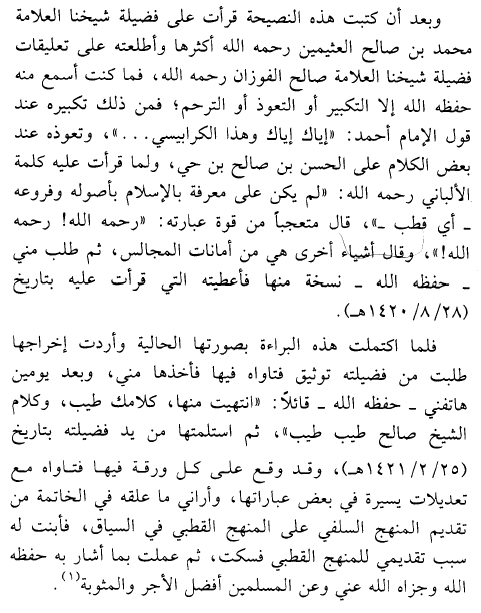
 And after I wrote this naseehah (i.e. this book), I read most of it to our esteemed Shaykh, the Allaamah, Muhammad bin Saalih al-Uthaymeen (rahimahullaah), and I showed him the (written) comments of our Shaykh Saalih al-Fawzaan (hafidhahullaah) So [whilst reading it to him] I did not hear from him (rahimahullaah) except takbeer (saying Allaahu Akbar), or ta'awwudh (seeking refuge) or tarahhum (praying for mercy). And from that is his saying the takbeer upon the saying of Imaam Ahmad, "Beware and beware of this al-Karaabeesee..." and his seeking refuge upon the speech upon al-Hasan bin Saalih bin Hayy, and when I read to him the words of al-Albaani (rahimahullaah), "He was not upon knowledge of Islaam, in its foundations and its branches" - meaning Qutb, he (Ibn Uthaymeen) said, surprised with the strength of expression, "Rahimahullaah! Rahimahullaah!". And he said other things that are from the amaanah (trust) of the [private] gatherings. Then he (hafidhahullaah) requested from me a copy of (the book) so I gave the one that I read to him on the date 28/8/1420H.
And after I wrote this naseehah (i.e. this book), I read most of it to our esteemed Shaykh, the Allaamah, Muhammad bin Saalih al-Uthaymeen (rahimahullaah), and I showed him the (written) comments of our Shaykh Saalih al-Fawzaan (hafidhahullaah) So [whilst reading it to him] I did not hear from him (rahimahullaah) except takbeer (saying Allaahu Akbar), or ta'awwudh (seeking refuge) or tarahhum (praying for mercy). And from that is his saying the takbeer upon the saying of Imaam Ahmad, "Beware and beware of this al-Karaabeesee..." and his seeking refuge upon the speech upon al-Hasan bin Saalih bin Hayy, and when I read to him the words of al-Albaani (rahimahullaah), "He was not upon knowledge of Islaam, in its foundations and its branches" - meaning Qutb, he (Ibn Uthaymeen) said, surprised with the strength of expression, "Rahimahullaah! Rahimahullaah!". And he said other things that are from the amaanah (trust) of the [private] gatherings. Then he (hafidhahullaah) requested from me a copy of (the book) so I gave the one that I read to him on the date 28/8/1420H.
Then when I had completed this [book] "al-Baraa'ah" in its current form, and desired to release it, I requested his excellence to verify his fatwas that were in it, so he took it (the script) from me, and after two days, he phone me (hafidhahullaah) saying, "I have finished it, your words are good, and the words of Shaykh Saalih [al-Fawzaan] are good, good".
Then I took them from the hand of his excellence, on 25/2/1421H, and on every page in which there was a fatwa of his, he placed his signature, along with some minor modifications in some expressions, and he showed me his comment at the end (of the book) recommending that the [section] on the Salafi Manhaj should precede the [section] on the Qutbi Manhaj, in its order. So I explained to him the reason for my placing the [section] on the Qutbi Manhaj, and he remained silent. So I acted upon what he alluded to (by his silence), hafidhahullaah, and on my behalf and that of the Muslims, [I ask] Allaah to reward him with the best reward and recompense.
And at the end of the book, the scan of the note of Shaykh Ibn Uthaymeen is provided, and here it is:
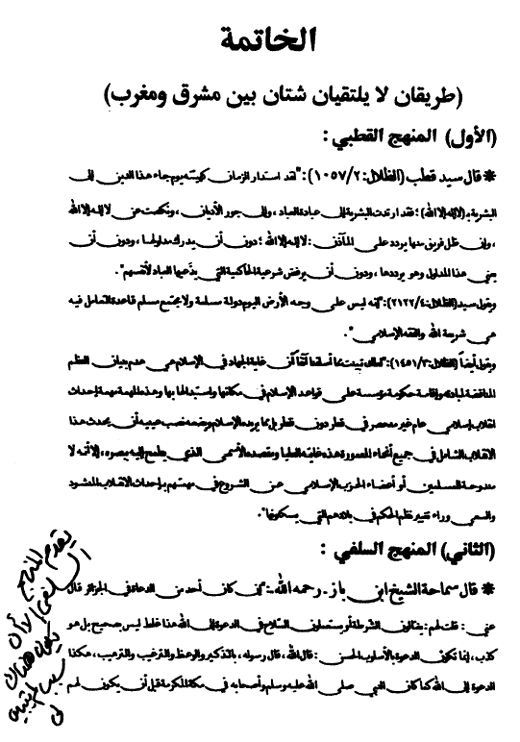
At the bottom of the page, Shaykh al-Uthaymeen wrote:
 The Salafi Manhaj should be given precedence (put first) unless there is a reason that is not clear to me.
The Salafi Manhaj should be given precedence (put first) unless there is a reason that is not clear to me.
The Section on the Salafi Manhaj Verses the Qutbi Manhaj
Here are the relevant pages after the book was put to print and this is from the second edition, pages 110-113:
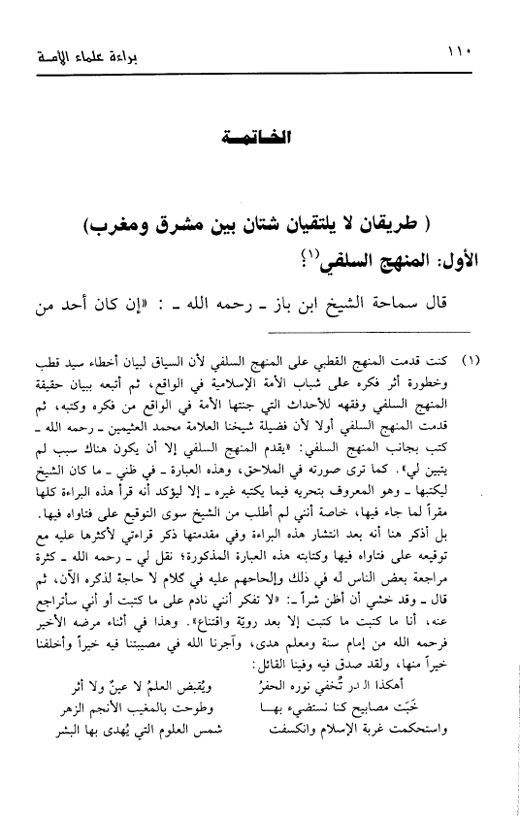
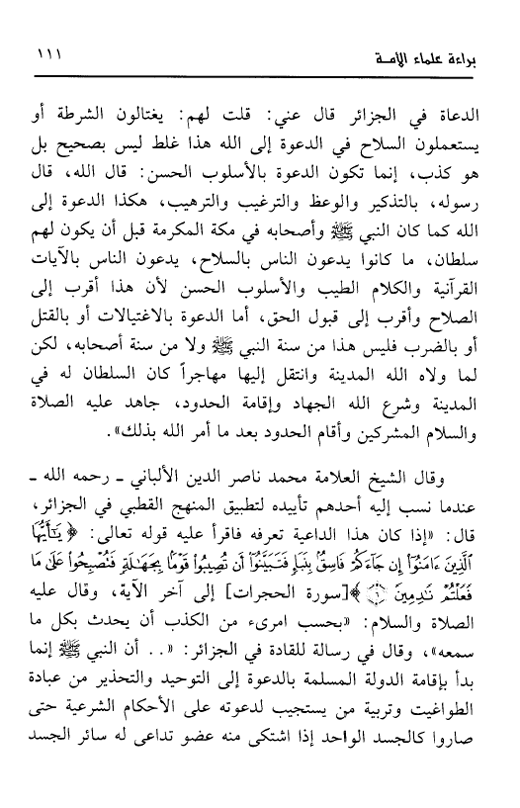
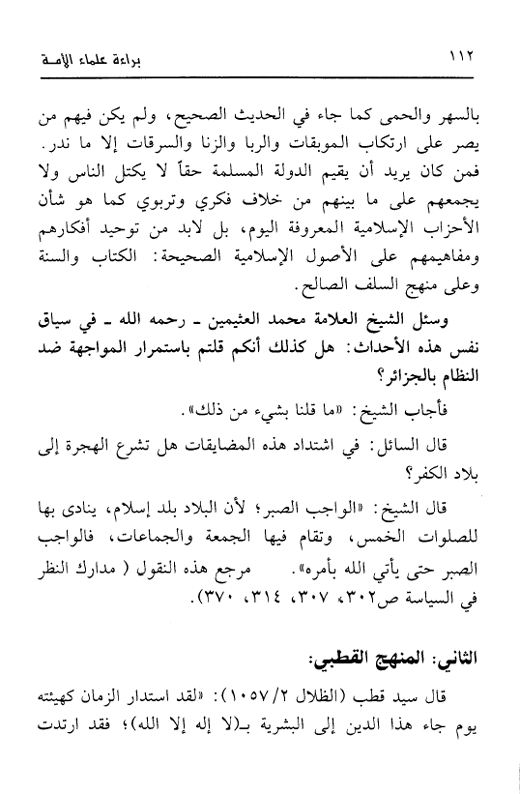
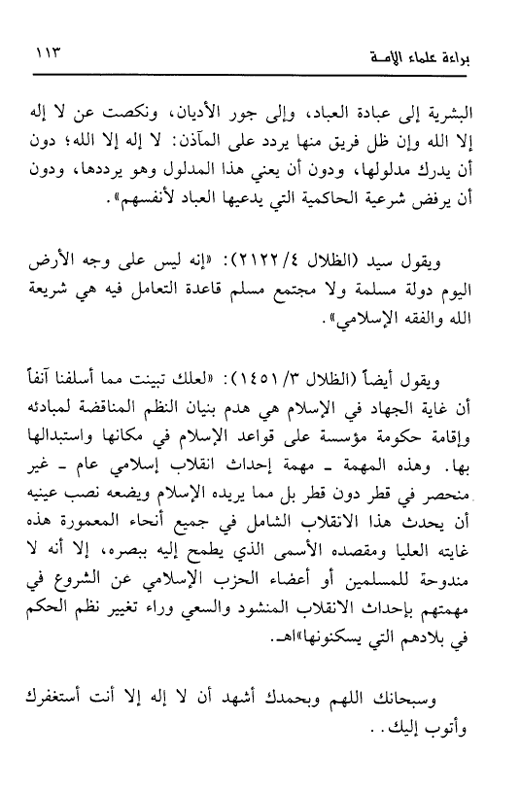
And in the first edition they appear on pages 115-119. Inshaa'Allaah these can be translated as a separate article, but from the above, the following should be noted:
- Shaykh Ibn Uthaymeen read the book and agreed with it, showed acceptance of it, checked it and checked over his own fatwas in the book.
- Shaykh Ibn Uthaymeen corroborates the existence of a "Qutbi Manhaj", that it is a world apart form the "Salafi Manhaj", in the sense that between them both is the distance between the East and the West, and this is because the author, Isaam bin Abdullaah as-Sinaanee, introduced the section with the title, "Two Ways That do Not Meet, How Different They Are, Between the East and the West", and then he titled "The Qutbi Manhaj" and then "The Salafi Manhaj", so Shaykh Ibn Uthaymeen corroborated all of that.
- What he included under the section "The Salafi Manhaj" were clarifications from each of Imaam Ibn Baaz, Imaam al-Albaani and Imaam Ibn Uthaymeen, all of them clearing the lies against them regarding alleged advices they were supposed to have given to the people of Algeria in the fitnah there in the 90s, and they clarified that their advice was and is that they call to Allaah beginning with Tawheed, and not to fight against the authorities, and that to establish Islaam, they have to establish it in the people first, in reality. And those people who made these false allegations about them were the Qutbiyyah of Saudi Arabia - and that is the subject of another article.
- What the author included under the section "The Qutbi Manhaj" is the Takfir of Sayyid Qutb of all Muslim societies, and his claim of the obligation of a worldwide revolution in toppling all authorities as a form of jihaad and to replace them with an Islamic government, and his call for every one in every country to this goal. Learn more about that manhaj here.
- And it is clear from all of this that Shaykh Ibn Uthaymeen corroborates the existence of "the Qutbiyyah" and "the Qutbi Manhaj" and this is not from the invention of the so called "Madkhalis". As we said, the hatred of these people is for all of the Scholars, its not about Shaykh Rabee' al-Madkhali, but the word "Madkhali" they use as a derogatory term is simply a veil through which they desire to attack the manhaj that all the Salafi Shaykhs were and are upon. That's what their real problem is.
It is apparent from all of the above that Shaykh Ibn Uthaymeen (rahimahullaah) would have to be considered - upon the language and understanding of the Takfiris and Qutbis - a "Madkhali" scholar, except that these people are too cowardly to express their denigration of the Shaykh in this manner, because then all people would know of their misguidance and fraud in claiming to be upon the Salafi aqidah and Salafi Manhaj. Add to this, the Shaykhs warning from the cassettes of the Qutbiyyah, Safar al-Hawali and Salman al-Awdah, and describing them with "thawrah fikriyyah" (Revolutionary Ideology), towards the end of his life, and then you no longer need any reason to explain why these people have to maintain this deception for as long as possible to avert people from the truth and from the clarifications of the Scholars.
Here's the deal (go and listen to the audio in this article then come back):
In the sixties, the failed Leninist manhaj that Qutb propounded to effect a second revolution in Egypt (after the first one he plotted which put his former close friend Jamal Abdul-Nasser in power) led to many of these Ikhwanis to flee the country so a fair share of them went to Saudi Arabia, including the brother of Qutb, Mohammad Qutb. By the late 80s these Ikhwani "asylum seekers" had effectively influenced many of the younger du'aat with the doctrines of Sayyid Qutb, and all evidences indicate collectively that these people were calling to this same methodology in Saudi Arabia. The first Gulf war took place in 1990, and these Qutbiyyah, as they became known, used it as an opportunity to bring their call out in the open.
From that moment, in 1990, and for the rest of the decade a great deal of turmoil and confusion appeared, when a group from the Scholars of the Madinah were first to figure out these Qutbiyyah, their orientations, aims and goals. Whilst the affair did not become clear to many of the scholars at the early stages of this fitnah, by the end of the decade and shortly after it, most of the scholars, including Shaykh Ibn Uthaymeen, Shaykh Ibn Baaz, and Shaykh al-Albaanee and others had explicitly affirmed that these people were upon a Revolutionary Ideology, that they were causing fitnah and sedition, and that they are upon the way of the Khawaarij, that their cassettes and books should not be listened to or distributed out of protection of the society - and so Leninism - the revolution led by an elite vanguard of sagacious, faithful believers had failed to come to fruition, because all revolutions start with an ideological stage, which is what these Qutbiyyah were doing, working ideologically with Mohammad Qutb pulling the strings, and this stage failed!
And they had disgraces more than this, such as what they were doing regarding Algeria and their destructive advices they were giving to the people. They were lying upon the major scholars by claiming their advices were coming from the major scholars, when they were not. They split the hearts of the people and entered hatred and dissension amongst them by being the vehicles through which the foreign ideologies (of Ikhwaan) were disseminated, splitting what was formerly only one united jamaa'ah (body of Muslims) into factions and instilling enmity and hatred between them! And inshaa'Allaah these disgraces will be covered in other articles.

